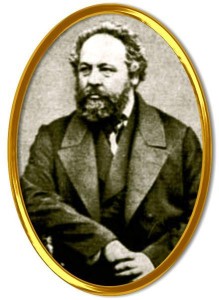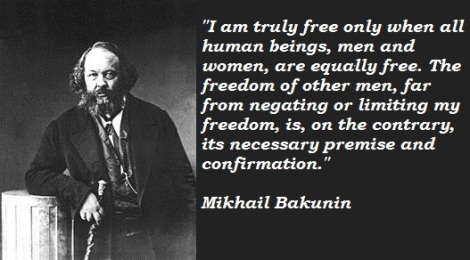Michael Bakunin (1871)
n March 1871, just after the proclamation of the Paris Commune, Michael Bakunin prepared a summary of his revolutionary principles, setting forth his critique of authority, his social conception of freedom, and his critique of the State. I included similar material from Bakunin in Volume One of Anarchism: A Documentary History of Libertarian Ideas, but the following passage on the State succinctly sets forth Bakunin’s position.
What is the State?
What is the State? It is the historic organization of authority and tutelage, divine and human, extended to the masses of people in the name of some religion, or in the name of the alleged exceptional and privileged ability of one or sundry property-owning classes, to the detriment of the great mass of workers whose forced labour is cruelly exploited by those classes.
Conquest, which became the foundation of property right and of the right of inheritance, is also the basis of every State. The legitimized exploitation of the labour of the masses for the benefit of a certain number of property-owners (most of whom are fictitious, there being only a very small number of those who exist in reality) consecrated by the Church in the name of a fictitious Divinity which has always been made to side with the strongest and cleverest—that is what is called right. The development of prosperity, comfort, luxury, and the subtle and distorted intellect of the privileged classes—a development necessarily rooted in the misery and ignorance of the vast majority of the population—is called civilization; and the organization guaranteeing the existence of this complex of historic iniquities is called the State.
So the workers must wish for the destruction of the State…
The State, necessarily reposing upon the exploitation and enslavement of the masses, and as such oppressing and trampling upon all the liberties of the people, and upon any form of justice, is bound to be brutal, conquering, predatory, and rapacious in its foreign relations. The State—any State, whether monarchy or republic—is the negation of humanity. It is the negation of humanity because, while setting as its highest or absolute aim the patriotism of its citizens, and placing, in accordance with its principles, above all other interests in the world the interests of its own self-preservation, of its own might within its own borders and its outward expansion, the State negates all particular interests and the human rights of its subjects as well as the rights of foreigners. And thereby the State violates international solidarity among peoples and individuals, placing them outside of justice, and outside of humanity…
The State is the younger brother of the Church. It can find no other reason for its existence apart from the theological or metaphysical idea. Being by its nature contrary to human justice, it has to seek its rationale in the theological or metaphysical fiction of divine justice. The ancient world lacked entirely the concept of nation or society, that is, the latter was completely enslaved and absorbed by the State, and every State deduced its origin and its special right of existence and domination from some god or system of gods deemed to be the exclusive patron of that State. In the ancient world man as an individual was unknown; the very idea of humanity was lacking. There were only citizens. That is why in that civilization slavery was a natural phenomenon and the necessary basis for the fruits of citizenship.
When Christianity destroyed polytheism and proclaimed the only God, the States had to revert to the saints from the Christian paradise; and every Catholic State had one or several patron saints, its defenders and intercessors before the Lord God, who on that occasion may well have found himself in an embarrassing position. Besides, every State still finds it necessary to declare that the Lord God patronizes it in some special manner.
Metaphysics and the science of law, based ideally upon metaphysics but in reality upon the class interests of the propertied classes, also sought to discover a rational basis for the fact of the existence of the State. They reverted to the fiction of the general and tacit agreement or contract, or to the fiction of objective justice and the general good of the people allegedly represented by the State.
According to the Jacobin democrats, the State has the task of making possible the triumph of the general and collective interests of all citizens over the egoistic interests of separate individuals, communes and regions. The State is universal justice and collective reason triumphing over the egoism and stupidity of individuals. It is the declaration of the worthlessness and the unreasonableness of every individual in the name of the wisdom and the virtue of all. It is the negation of fact, or, which is the same thing, infinite limitation of all particular liberties, individual and collective, in the name of freedom for all—the collective and general freedom which in reality is only a depressing abstraction, deduced from the negation or the limitation of the rights of separate individuals and based upon the factual slavery of everyone.
In view of the fact that every abstraction can exist only inasmuch as it is backed up by the positive interests of a real being, the abstraction, the State, in reality represents the positive interests of the ruling and property owning, exploiting, and so-called intelligent classes, and also the systematic immolation for their benefit of the interests and freedom of the enslaved masses.
Michael Bakunin, March 25-30, 1871

